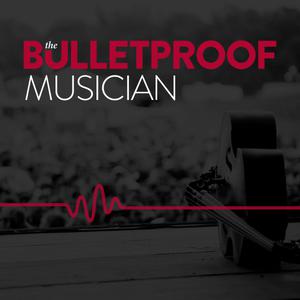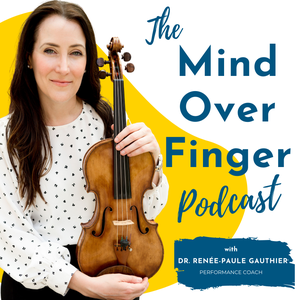
The Bulletproof Musician
Noa Kageyama
Ever wonder why you can practice for hours, sound great in the practice room, and still be frustratingly hit or miss on stage? Join performance psychologist and Juilliard alumnus/faculty Noa Kageyama, and explore research-based “practice hacks” for beating anxiety, practicing more effectively, and playing up to your full abilities when it matters most.
- 10 minutes 49 secondsWhat Causes "Choking" Under Pressure? And What Can We Do About It?
Have you ever had one of those days on stage where you suddenly can't seem to do a thing that normally is never an issue?
Or maybe it's one of those days where everything just spontaneously falls apart? And for seemingly no reason at all, even though you were as prepared as you've ever been?
Athletes call this "choking." Or the "yips" (which I think is funner to say). There's actually been quite a bit of interesting research on why this happens. And the answer is way more interesting than "nerves" or "pressure."
Get all the nerdy details on why this happens and what you can do about it here:
What Causes "Choking" Under Pressure? And What Can We Do About It?* * *
Have you been feeling stuck in the practice room, like your progress has plateaued? Or maybe performance anxiety continues to sneak up on you, even when you know you’ve prepared as much as you possibly could - for performances, auditions, or even lessons?
If you’ve been wanting to experience more satisfaction and progress in the practice room, and play more like yourself on stage, I’ll be teaching a live online, 4-week class addressing these frustrating - but solvable - challenges starting February 2, 2025.
In this class, we’ll explore four key skill areas—effective practice, managing anxiety, enhancing focus, and building confidence. Through weekly Zoom sessions, we’ll work on practical, research-based exercises as a group. And to help these skills become lasting habits, you’ll get bite-sized practice challenges to gently weave into your daily routine, supported by a global community of practice buddies.
Registration is open now through Sunday, January 26th
Over 2000 musicians, educators, and learners of all ages have already gone through the course. You can read their stories and sign up to join Cohort 21 at: bulletproofmusician.com/essentials19 January 2025, 8:00 am - 9 minutes 7 secondsThe Truth About Cramming: Why Your Brain Needs Breaks
Taking breaks in the middle of practice or study sessions can be a pain. Often, it's a lot easier and more convenient to just power through and get it over with.
But what price do we pay by not spacing out our learning, over multiple days, or with practice or study breaks? Does this really make that much of a difference?
Two studies from the literature suggest that spaced learning can make quite a significant difference, actually. And one study explains why, highlighting the very different things that happen in the brain when we take breaks vs when we don't.
Get all the nerdy details and references here:
The Truth About Cramming: Why Your Brain Needs Breaks* * *
Have you been feeling stuck in the practice room, like your progress has plateaued? Or maybe performance anxiety continues to sneak up on you, even when you know you’ve prepared as much as you possibly could - for performances, auditions, or even lessons?
If you’ve been wanting to experience more satisfaction and progress in the practice room, and play more like yourself on stage, I’ll be teaching a live online, 4-week class addressing these frustrating - but solvable - challenges starting February 2, 2025.
In this class, we’ll explore four key skill areas—effective practice, managing anxiety, enhancing focus, and building confidence. Through weekly Zoom sessions, we’ll work on practical, research-based exercises as a group. And to help these skills become lasting habits, you’ll get bite-sized practice challenges to gently weave into your daily routine, supported by a global community of practice buddies.
Registration is open now through Sunday, January 26th
Over 2000 musicians, educators, and learners of all ages have already gone through the course. You can read their stories and sign up to join Cohort 21 at: bulletproofmusician.com/essentials12 January 2025, 8:00 am - 53 minutes 59 secondsOrli Shaham: On Overcoming Setbacks and Learning to Trust the Process
Ever had one of those “I’m a total failure, and I’m never going to be invited to play with these folks again” moments?
In this month’s chat, pianist Orli Shaham shares a deeply personal story about a performance at the Spoleto Festival in Italy, where rehearsals went so badly, that the piece she prepared was pulled from the program. It felt like a “complete failure” at the time, but the experience prompted her to evaluate her preparation process. Which eventually led to one of her career highlights - a performance of John Adams’s first piano concerto, in Carnegie Hall, where Adams came onstage during the applause and gave her the greatest compliment she could have asked for, as he said “You got it. You really got it.”
If you’ve ever struggled with feeling out of your depth, this episode is for you.
Get all the nerdy details right here:
Orli Shaham: On Overcoming Setbacks and Learning to Trust the Process* * *
Have you been feeling stuck in the practice room, like your progress has plateaued? Or maybe performance anxiety continues to sneak up on you, even when you know you’ve prepared as much as you possibly could - for performances, auditions, or even lessons?
If you’ve been wanting to experience more satisfaction and progress in the practice room, and play more like yourself on stage, I’ll be teaching a live online, 4-week class addressing these frustrating - but solvable - challenges starting February 2, 2025.
In this class, we’ll explore four key skill areas—effective practice, managing anxiety, enhancing focus, and building confidence. Through weekly Zoom sessions, we’ll work on practical, research-based exercises as a group. And to help these skills become lasting habits, you’ll get bite-sized practice challenges to gently weave into your daily routine, supported by a global community of practice buddies.
Registration is open now through Sunday, January 26th
Over 2000 musicians, educators, and learners of all ages have already gone through the course. You can read their stories and sign up to join Cohort 21 at: bulletproofmusician.com/essentials5 January 2025, 8:00 am - 8 minutes 7 secondsA Backward Strategy for Enhanced Goal-Setting Success
Maybe you've set some goals for the coming year, but you're not quite sure where to start, and feeling a little overwhelmed? Or maybe you have a history of setting goals but not following through?
A 2017 study looked at a "backwards" strategy for goal-setting and found that this increased motivation, follow-through, and actual performance as well!
Get all the nerdy details here:
A Backward Strategy for Enhanced Goal-Setting Success* * *
Have you been feeling stuck in the practice room, like your progress has plateaued? Or maybe performance anxiety continues to sneak up on you, even when you know you’ve prepared as much as you possibly could - for performances, auditions, or even lessons?
If you’ve been wanting to experience more satisfaction and progress in the practice room, and play more like yourself on stage, I’ll be teaching a live online, 4-week class addressing these frustrating - but solvable - challenges starting February 2, 2025.
In this class, we’ll explore four key skill areas—effective practice, managing anxiety, enhancing focus, and building confidence. Through weekly Zoom sessions, we’ll work on practical, research-based exercises as a group. And to help these skills become lasting habits, you’ll get bite-sized practice challenges to gently weave into your daily routine, supported by a global community of practice buddies.
Registration is open now through Sunday, January 26th
Over 2000 musicians, educators, and learners of all ages have already gone through the course. You can read their stories and sign up to join Cohort 21 at: bulletproofmusician.com/essentials29 December 2024, 8:00 am - 7 minutes 49 seconds4 Approaches to Goal Setting (And Which Works Best)
Are you a little overwhelmed by all of the different year-in-review and goal-setting methods you're getting in your inbox?
If you're confused by the variety and range of approaches out there and just want a bare-bones minimalist option to ensure that you actually do it, a 2006 study of four different goal-setting strategies provides some simple, clear guidelines.
Get all the nerdy details here:
4 Approaches to Goal Setting (And Which Works Best)* * *
Have you been feeling stuck in the practice room, like your progress has plateaued? Or maybe performance anxiety continues to sneak up on you, even when you know you’ve prepared as much as you possibly could - for performances, auditions, or even lessons?
If you’ve been wanting to experience more satisfaction and progress in the practice room, and play more like yourself on stage, I’ll be teaching a live online, 4-week class addressing these frustrating - but solvable - challenges starting February 2, 2025.
In this class, we’ll explore four key skill areas—effective practice, managing anxiety, enhancing focus, and building confidence. Through weekly Zoom sessions, we’ll work on practical, research-based exercises as a group. And to help these skills become lasting habits, you’ll get bite-sized practice challenges to gently weave into your daily routine, supported by a global community of practice buddies.
Registration is open now through Sunday, January 26th
Over 2000 musicians, educators, and learners of all ages have already gone through the course. You can read their stories and sign up to join Cohort 21 at: bulletproofmusician.com/essentials22 December 2024, 8:00 am - 7 minutes 8 secondsDo Extroverts Make Better Performers Than Introverts?
Have you ever wondered if there's an advantage to being an extrovert or introvert when it comes to performing?
Well, I'm afraid you're going to have to keep wondering, because I couldn't find a definitive answer one way or the other from the existing research.
But I did find an interesting study of figure skaters, which looked at the impact of *shyness* on performance. It's important to note that being introverted and being shy are NOT the same thing. But could being shy have some effect on how well we're able to perform?
Get all the nerdy details here:
Do Extroverts Make Better Performers Than Introverts?* * *
Have you been feeling stuck in the practice room, like your progress has plateaued? Or maybe performance anxiety continues to sneak up on you, even when you know you’ve prepared as much as you possibly could - for performances, auditions, or even lessons?
If you’ve been wanting to experience more satisfaction and progress in the practice room, and play more like yourself on stage, I’ll be teaching a live online, 4-week class addressing these frustrating - but solvable - challenges starting February 2, 2025.
In this class, we’ll explore four key skill areas—effective practice, managing anxiety, enhancing focus, and building confidence. Through weekly Zoom sessions, we’ll work on practical, research-based exercises as a group. And to help these skills become lasting habits, you’ll get bite-sized practice challenges to gently weave into your daily routine, supported by a global community of practice buddies.
Registration is open now through Sunday, January 26th
Over 2000 musicians, educators, and learners of all ages have already gone through the course. You can read their stories and sign up to join Cohort 21 at: bulletproofmusician.com/essentials15 December 2024, 8:00 am - 51 minutes 5 secondsLaurie Scott & Cornelia Watkins: On Going From the Stage to the Studio
“See one, do one, teach one” is a model for learning that’s been utilized in medicine for many generations.
It’s quite a helpful model, but if you’ve ever tried your hand at teaching, you know how incredibly challenging that can be. Often, teaching a skill can be even more difficult that doing the skill itself!
Like, how can we teach a student to be more expressive? How can we ensure each student has a positive emotional connection with the music at each lesson - even if just for a moment? How can we turn students into active/inquisitive learners rather than passive/compliant learners?
Laurie Scott (University of Texas at Austin) and Cornelia Watkins (Northwestern University) co-authored From the Stage to the Studio: How Fine Musicians Become Great Teachers, which is written for university studio faculty, music pedagogy teachers, college music majors, and performing musicians, who are looking to be more effective in their teaching.
In this month’s chat, we’ll learn more about the synergistic relationship between playing and teaching, the problems of dividing music students into “pedagogy” and “performance” majors, how we can teach musical expression very early on in a student’s development, how we can all become better teachers using a technique that won’t come as a surprise but most of us will probably try to avoid, how to help your students become better noticers, and much more.
Get all the nerdy details here:
Laurie Scott & Cornelia Watkins: On Going From the Stage to the Studio* * *
Have you been feeling stuck in the practice room, like your progress has plateaued? Or maybe performance anxiety continues to sneak up on you, even when you know you’ve prepared as much as you possibly could - for performances, auditions, or even lessons?
If you’ve been wanting to experience more satisfaction and progress in the practice room, and play more like yourself on stage, I’ll be teaching a live online, 4-week class addressing these frustrating - but solvable - challenges starting February 2, 2025.
In this class, we’ll explore four key skill areas—effective practice, managing anxiety, enhancing focus, and building confidence. Through weekly Zoom sessions, we’ll work on practical, research-based exercises as a group. And to help these skills become lasting habits, you’ll get bite-sized practice challenges to gently weave into your daily routine, supported by a global community of practice buddies.
Registration is open now through Sunday, January 26th
Over 2000 musicians, educators, and learners of all ages have already gone through the course. You can read their stories and sign up to join Cohort 21 at: bulletproofmusician.com/essentials8 December 2024, 8:00 am - 11 minutes 41 secondsDoes How We Look On Stage Matter More Than How We Sound...?
Have you ever wondered how much the visual aspect of a performance matters to the listener?
Like, if you were going to enter two competitions, where one required submitting an audio recording and the other required a video recording, which one would you have a better chance of being accepted to? Or would it make any difference at all?
A 2013 study of international competition finalists went viral, when it seemed like the results suggested that how a musician looks on stage matters more than how they sound. But is that really what the study found?
Get all the nerdy details here:
Does How We Look On Stage Matter More Than How We Sound...?* * *
Have you been feeling stuck in the practice room, like your progress has plateaued? Or maybe performance anxiety continues to sneak up on you, even when you know you’ve prepared as much as you possibly could - for performances, auditions, or even lessons?
If you’ve been wanting to experience more satisfaction and progress in the practice room, and play more like yourself on stage, I’ll be teaching a live online, 4-week class addressing these frustrating - but solvable - challenges starting February 2, 2025.
In this class, we’ll explore four key skill areas—effective practice, managing anxiety, enhancing focus, and building confidence. Through weekly Zoom sessions, we’ll work on practical, research-based exercises as a group. And to help these skills become lasting habits, you’ll get bite-sized practice challenges to gently weave into your daily routine, supported by a global community of practice buddies.
Registration is open now through Sunday, January 26th
Over 2000 musicians, educators, and learners of all ages have already gone through the course. You can read their stories and sign up to join Cohort 21 at: bulletproofmusician.com/essentials1 December 2024, 8:00 am - 6 minutes 56 secondsDoes Counting Our Blessings Really Change Anything?
Thanksgiving is just a few days away, so whether your holiday will be of the turkey, turducken, or Tofurky variety, the one thing we all have in common is that someone will suggest that we go around the table and share one thing that we're grateful for, just as we're about to eat. 🥹
There are an awful lot of quotes out there about how we ought to count our blessings. And it does sound like a good thing to do. But does this actually do anything?
Get all the nerdy details right here:
Does Counting Our Blessings Really Change Anything?* * *
Have you been feeling stuck in the practice room, like your progress has plateaued? Or maybe performance anxiety continues to sneak up on you, even when you know you’ve prepared as much as you possibly could - for performances, auditions, or even lessons?
If you’ve been wanting to experience more satisfaction and progress in the practice room, and play more like yourself on stage, I’ll be teaching a live online, 4-week class addressing these frustrating - but solvable - challenges starting February 2, 2025.
In this class, we’ll explore four key skill areas—effective practice, managing anxiety, enhancing focus, and building confidence. Through weekly Zoom sessions, we’ll work on practical, research-based exercises as a group. And to help these skills become lasting habits, you’ll get bite-sized practice challenges to gently weave into your daily routine, supported by a global community of practice buddies.
Registration is open now through Sunday, January 26th
Over 2000 musicians, educators, and learners of all ages have already gone through the course. You can read their stories and sign up to join Cohort 21 at: bulletproofmusician.com/essentials24 November 2024, 8:00 am - 9 minutes 59 secondsAn Easier Way to Get Better at Mental Imagery?
You've heard that mental practice and mental imagery can help enhance your learning - but what if your images are fuzzy and this is difficult for you? Is this something that you can get better at with practice?
Spoiler alert: yes - and a 2014 study provides some insights into a way to improve your mental imagery abilities that might be easier than practicing imagery the regular old-fashioned way. Through a technique called "action observation."
But is action observation as effective as the traditional way of practicing imagery?
Get all the nerdy details, references, and more right here:
An Easier Way to Get Better at Mental Imagery?* * *
Have you been feeling stuck in the practice room, like your progress has plateaued? Or maybe performance anxiety continues to sneak up on you, even when you know you’ve prepared as much as you possibly could - for performances, auditions, or even lessons?
If you’ve been wanting to experience more satisfaction and progress in the practice room, and play more like yourself on stage, I’ll be teaching a live online, 4-week class addressing these frustrating - but solvable - challenges starting February 2, 2025.
In this class, we’ll explore four key skill areas—effective practice, managing anxiety, enhancing focus, and building confidence. Through weekly Zoom sessions, we’ll work on practical, research-based exercises as a group. And to help these skills become lasting habits, you’ll get bite-sized practice challenges to gently weave into your daily routine, supported by a global community of practice buddies.
Registration is open now through Sunday, January 26th
Over 2000 musicians, educators, and learners of all ages have already gone through the course. You can read their stories and sign up to join Cohort 21 at: bulletproofmusician.com/essentials17 November 2024, 8:00 am - 8 minutes 29 secondsA Better Way to Do Mental Practice?
The use of mental practice or mental imagery to enhance learning and performance is extremely common amongst athletes in sports. And it’s something that musicians like Horowitz, Rubinstein, Glenn Gould, and learners at all levels have been known to use in music as well.
But I’ve had students and professional musicians alike tell me that they sometimes have difficulty making the imagery feel real. Or that they have difficulty staying engaged with it. As in, one minute they’re visualizing some music, and the next, their mind has drifted off to food. Or they fall asleep. 🤣
Could there be a better way to do visualization?
Get all the nerdy details and study links here:
A Better Way to Do Mental Practice?* * *
Have you been feeling stuck in the practice room, like your progress has plateaued? Or maybe performance anxiety continues to sneak up on you, even when you know you’ve prepared as much as you possibly could - for performances, auditions, or even lessons?
If you’ve been wanting to experience more satisfaction and progress in the practice room, and play more like yourself on stage, I’ll be teaching a live online, 4-week class addressing these frustrating - but solvable - challenges starting February 2, 2025.
In this class, we’ll explore four key skill areas—effective practice, managing anxiety, enhancing focus, and building confidence. Through weekly Zoom sessions, we’ll work on practical, research-based exercises as a group. And to help these skills become lasting habits, you’ll get bite-sized practice challenges to gently weave into your daily routine, supported by a global community of practice buddies.
Registration is open now through Sunday, January 26th
Over 2000 musicians, educators, and learners of all ages have already gone through the course. You can read their stories and sign up to join Cohort 21 at: bulletproofmusician.com/essentials10 November 2024, 8:00 am - More Episodes? Get the App
Your feedback is valuable to us. Should you encounter any bugs, glitches, lack of functionality or other problems, please email us on [email protected] or join Moon.FM Telegram Group where you can talk directly to the dev team who are happy to answer any queries.
 Sticky Notes: The Classical Music Podcast
Sticky Notes: The Classical Music Podcast
 The Mind Over Finger Podcast
The Mind Over Finger Podcast
 Classical Breakdown
Classical Breakdown
 The New Music Business with Ari Herstand
The New Music Business with Ari Herstand
 The Ezra Klein Show
The Ezra Klein Show
 Misquoting Jesus with Bart Ehrman
Misquoting Jesus with Bart Ehrman